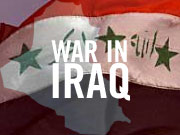Photos
Your Voice
| ||||||||||||||||||||||||||||||||
One year later, peace activists not giving up
March 19, 2004
A year ago, opponents of war with Iraq took to the streets by the thousands across the country and in Minnesota. In the weeks and months following the invasion, visible opposition to the war dwindled. Now, a year after the conflict began, anti-war activists say they haven't given up, but they are changing their strategy.
St. Paul, Minn. — Just after the war started last March, a record number of protesters spilled into the streets in downtown Minneapolis to show their opposition to the U.S. attack on Iraq.
At a news conference, protest organizers pledged to keep up the pressure every day until the war ended. Jess Sundin spoke for the Anti-War Committee. "The administration expects us to fall silent," she said. "And the opposite is going to be true. The protests are going to be more frequent, there's going to be more people. They're going to be louder, we're going to march further. We're not giving up."
The protests continued for a few weeks. One of the largest took place on the day the statue of Saddam Hussein fell in Baghdad. About 1000 protesters showed up at the Lake Street bridge, connecting Minneapolis and St. Paul.
On the eve of the war's one year anniversary, the scene on the bridge is much more quiet.
There's just a smattering of folks - a couple dozen people, holding peace signs, soliciting honks with a friendly wave. They're mostly retirees like Jan Scofield of Crystal. She's one of a core group who has come every week since the war began.
Scofield says it is discouraging to see the numbers dwindle.
 | |||
"People just accept there's a war going on and that there's nothing they can do about it, I think. Before the war happened, more people were just anxious to protest it, but now they just kind of think, 'oh well.'"
Though taking to the streets didn't stop the war, activists like Phil Steger say the collective outcry did have an impact.
"Last year when we saw the administration go to the United Nations, kicking and screaming really, we saw the success of the anti-war movement. When we saw Colin Powell making his presentation to the Security Council, I saw the success of the peace movement, forcing the administration into the position where they had to lay their case out on the table. A case that we see now was full of holes," Steger says.
Over the past year, Steger and other local activists have turned their energies toward the electoral process. They created a peace platform they hope will influence the upcoming presidential election. They call their strategy Peace in the Precincts. Steger says it takes the power of public protest and injects it into the political system.
"Peace in the Precincts is about regular folks talking to their neighbors about their fears, about their values, and about the policies that they believe will truly be affective in bringing about peace and freedom, and then taking those policies and bringing them to the political process," he says.
Peace in the Precincts is a more pragmatic approach to activism, says historian Doug Rossinow.
Rossinow teaches at Metropolitan State University in Minneapolis. He's the author of a book about the 1960s anti-war movement. He says the latest public opinion polls, which show a growing skepticism about the war, provide the the anti-war movement with an opportunity that street protests do not.
 | |||
"I'm not in the business of giving advice to anti-war protesters. But if I were, I would say that if they want to have an impact on the political process and on public opinion in general, they need to focus on those criticisms of the present administration's policy that are relatively widely shared, and moral criticism is not the type that is broadly shared within the American public," Rossinow says.
But activists aren't giving up on protests. On Saturday, thousands of people are expected to rally on the Capitol steps in St. Paul. It's part of a global day of protest to mark the anniversary of the war.
|
News Headlines
|
Related Subjects
|


